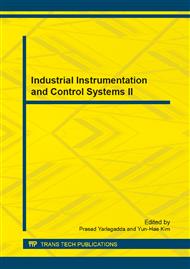p.561
p.566
p.570
p.575
p.581
p.585
p.590
p.595
p.599
Diagonal Recurrent Neural Network-Based Electro-Hydraulic Servo System Control
Abstract:
The electro-hydraulic servo system gradually processes toward the fast, high-power and high-precision direction. The traditional PID control needs to coordinate the contradiction between rapidity and stability, and cannot meet the system performance requirements in the case of parameter variations and external interference. Based on electro-hydraulic servo system structure and principles, system mathematical model was established, and Diagonal Recurrent Neural Network (DRNN)-based adaptive PID controller was designed and compared with positional PID control. The simulation results show that: DRNN adaptive PID control effect is superior to positional PID control, which can effectively improve the system dynamic and anti-interference performance, and has strong self-learning and adaptive capacity.
Info:
Periodical:
Pages:
581-584
Citation:
Online since:
July 2013
Price:
Сopyright:
© 2013 Trans Tech Publications Ltd. All Rights Reserved
Share:
Citation:


